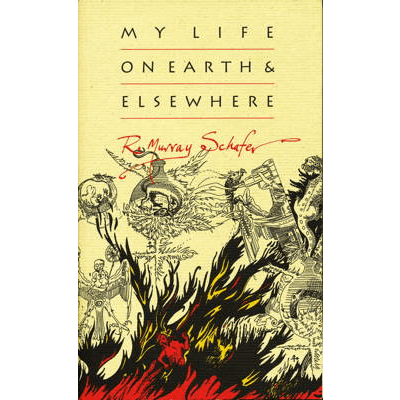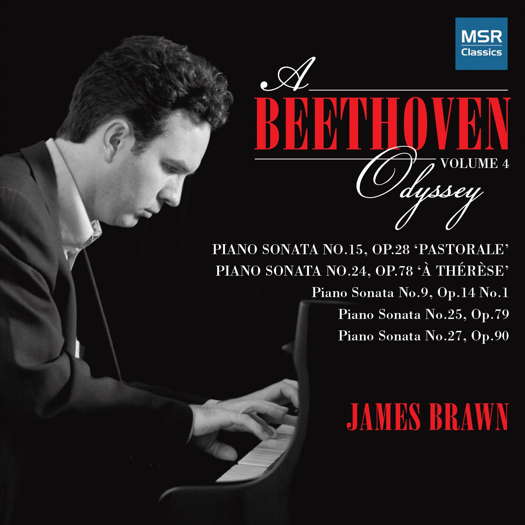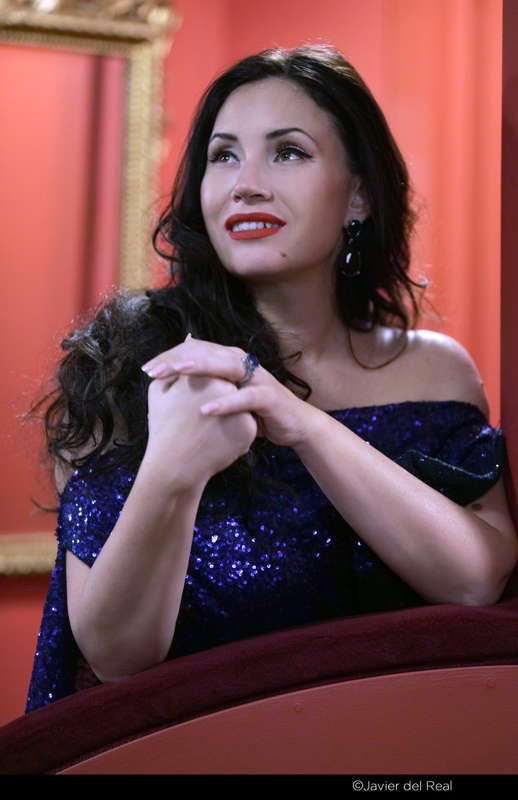 SPONSORED: So Much, for So Many. R Murray Schafer's 'My Life on Earth and Elsewhere', read by A P Virag.
SPONSORED: So Much, for So Many. R Murray Schafer's 'My Life on Earth and Elsewhere', read by A P Virag.
All sponsored features >>
 DISCUSSION: John Dante Prevedini leads a discussion about Composers, individuals or collective?, including contributions from David Arditti, Halida Dinova, Robert McCarney and Jane Stanley.
DISCUSSION: John Dante Prevedini leads a discussion about Composers, individuals or collective?, including contributions from David Arditti, Halida Dinova, Robert McCarney and Jane Stanley.
 SPONSORED: CD Spotlight. Pure Magic - James Brawn's continued Beethoven Odyssey, awaited by Andrew Schartmann.
SPONSORED: CD Spotlight. Pure Magic - James Brawn's continued Beethoven Odyssey, awaited by Andrew Schartmann.
All sponsored features >>
A Fast Rising Career
Bulgarian soprano Sonya Yoncheva's Met Stars recital with pianist Julien Quentin, experienced by MARIA NOCKIN
On Saturday 27 February 2021 at 13:00 Eastern Time (19:00 Central European Time), soprano Sonya Yoncheva and pianist Julien Quentin performed a recital at the stunningly beautiful library of Germany's Kloster Schussenried Monastery. The concert was video streamed live on metstarslive.brightcove-services.com and is available for the next two weeks for US$ 20.
The Schussenried Library has incredibly detailed paintings not only on its ceilings but also on the underside of the balcony that runs the length and width of the library. The program opened with a conversation between Wagnerian soprano Christine Goerke and Metropolitan Opera General Manager Peter Gelb about the fast rising career of Bulgarian soprano Sonya Yoncheva.
The recital which followed contained arias from popular operas and music from lesser known works that deserve to be better known. Passing between dark red marble columns, Yoncheva appeared swathed in yards of bright red chiffon, her dark hair offset by long, sparkling clear and dark red stoned earrings.
She opened with the rousing opening line of the Act I aria, 'Ritorna Vincitor' from Verdi's Aida. Having joined the chorus in wishing for an Egyptian win, the Ethiopian slave Aida realizes that victory would bring death to her brothers, and she laments her utterance. A fine actress, Yoncheva showed her heartfelt wishes in both sound and action. With barely time to catch her breath in between, Yoncheva and Quentin launched another difficult aria, 'Tacea la Notte' from Verdi's Il trovatore. This aria calls for the coloratura and flexibility of early Verdi instead of the solid strength of tone needed for his later opus, Aida, but that presented no problem for the red-clad diva.

Sonya Yoncheva. Photo © Javier del Real
The 'Addio senza rancor', a simple monologue from La bohème, may have provided a bit of respite, and it was sensitively sung with a poignant ending. Yoncheva followed it with a revealing take on Dvořák's 'Song to the Moon'. Sometimes listeners think the Czech words tell of the moon's beauty and sing its praises. It does nothing of the kind. Rusalka first addresses it as fickle. She asks it to tell her lover she is waiting for him, as she does not know where he is. That is a great deal more dramatic than the apotheosis of a heavenly body and Yoncheva brought out Rusalka's loneliness and longing.
Here, the artists interrupted the live program with clips from the Met's Live in HD production of Verdi's Otello. Bass-baritone Eric Owens and Yoncheva spoke briefly about Yoncheva's Desdemona, after which we saw her sing the 'Ave Maria', tragically praying for 'one who bows under injustice and misfortune'.
Returning to the live program, Yoncheva and Quentin perform an amusing version of 'Se come voi piccina io fossi, o vaghi fior' (If I were tiny like you, or a wild flower), from Puccini's Le Villi. Entering with a dozen long stemmed deep red roses, the soprano launches a flower toward each corner of the stage at the end of every line she sings. The aria ends with 'Don't forget me'. She needn't worry, she is definitely not forgettable.
Ending the levity, the singer offered two heart-rending laments, perhaps appropriate for this time of pandemic: 'When I am laid in earth' from Purcell's Dido and Aeneas and 'Lascia ch'io pianga' (Let me weep over my cruel fate, and let me sigh for liberty) from Handel's Rinaldo. Somehow Yoncheva's soprano voice seemed a bit bright for the Purcell, but the Handel was spot on. Loved the piano decoration in the interlude. The soprano decorated a few notes at the end, too. Yoncheva finished this group with red lighting and 'Un bel di' (One Fine Day) from Puccini's Madama Butterfly which Gelb told us she would sing in an upcoming season. I'm sure the house will be overflowing whenever she does sing it.
The next HD clip from Tosca was as interesting visually as vocally. Since she is far less physically powerful than Scarpia is, Tosca needs to grab a steak knife off the table and stab him without losing the element of surprise. In David McVicar's staging, Tosca doesn't think of using the knife at first. When it occurs to her, she hides it in the folds of her skirt and when Željko Lučić as Scarpia grabs her, she stabs him in the abdomen and then in the chest. Yoncheva's 'Avanti a lui tremava tutta Roma' (Before him all Rome trembled) was a tragic song of triumph.
The finale of the live stream began with Yoncheva singing bad girls' arias. Thais looks in a hand mirror and says, 'Dis-moi que je suit belle' (Tell me I'm beautiful). Thais may be getting old, but Yoncheva is not and her aria was lovely. She followed it with Manon's 'Adieu, Notre petite table' (Good-bye to our little table) in which the soprano says that although Des Grieux loves her, she prefers a luxurious life with a rich man.
Carmen blames the vagaries of her life on that rebellious bird called love in her 'Habañera'. As for singing the entire role of Carmen, I think the Act III Card Song would be low for her voice. I did, however, love the way Yoncheva danced around the piano and sat behind Quentin on his piano bench.
At that point, Yoncheva spoke to the huge international audience saying that the 'Hymne à l'amour' with music by Marguerite Monnot and lyrics by Édith Piaf was one of her favorite pieces. It reminds us that time spent loving is never wasted. Perhaps we should spend more time loving and less time complaining.
The recital with Yoncheva was a thoroughgoing delight. The singing was captivating and powerful while the accompaniment was uplifting. Met Stars Recitals permit viewers to see two aspects of each artist. While the HD clips provide the recitalist with a much needed rest, they show that artist playing an opera role and the live program displays the same artist's ability to hold the stage alone.
Copyright © 2 March 2021
Maria Nockin,
Arizona USA

MORE METROPOLITAN OPERA ARTICLES
FURTHER CLASSICAL MUSIC ARTICLES ABOUT GERMANY
FURTHER CLASSICAL MUSIC ARTICLES ABOUT BULGARIA


